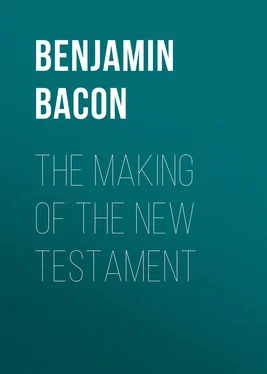Benjamin Bacon - The Making of the New Testament
Здесь есть возможность читать онлайн «Benjamin Bacon - The Making of the New Testament» — ознакомительный отрывок электронной книги совершенно бесплатно, а после прочтения отрывка купить полную версию. В некоторых случаях можно слушать аудио, скачать через торрент в формате fb2 и присутствует краткое содержание. ISBN: , Жанр: foreign_antique, foreign_prose, на английском языке. Описание произведения, (предисловие) а так же отзывы посетителей доступны на портале библиотеки ЛибКат.
- Название:The Making of the New Testament
- Автор:
- Жанр:
- Год:неизвестен
- ISBN:http://www.gutenberg.org/ebooks/39288
- Рейтинг книги:5 / 5. Голосов: 1
-
Избранное:Добавить в избранное
- Отзывы:
-
Ваша оценка:
- 100
- 1
- 2
- 3
- 4
- 5
The Making of the New Testament: краткое содержание, описание и аннотация
Предлагаем к чтению аннотацию, описание, краткое содержание или предисловие (зависит от того, что написал сам автор книги «The Making of the New Testament»). Если вы не нашли необходимую информацию о книге — напишите в комментариях, мы постараемся отыскать её.
The Making of the New Testament — читать онлайн ознакомительный отрывок
Ниже представлен текст книги, разбитый по страницам. Система сохранения места последней прочитанной страницы, позволяет с удобством читать онлайн бесплатно книгу «The Making of the New Testament», без необходимости каждый раз заново искать на чём Вы остановились. Поставьте закладку, и сможете в любой момент перейти на страницу, на которой закончили чтение.
Интервал:
Закладка:
It is hopeless at the present stage of acquaintance with the history of religion, particularly the spread of the various 'mysteries' and religions of personal redemption in the early empire, to deny this contrast between the gospel of Paul and the gospel of "the apostles and elders at Jerusalem." It is shortsighted to overlook its significance in the transition of the faith. Whereas the Jewish-Christian had as its principal background the national history, more or less transcendentalized in the forms of apocalypse, Paul's had as its principal background the speculative mythology of the Hellenistic world, more or less adapted to the forms of Judaism. Only ignorance of the function of mythology, especially as then employed to express the aspiration of the soul for purity, life and fellowship with God, can make these mythologically framed religious ideas seem an inappropriate vehicle to convey Paul's sense of the significance of Jesus' message and life of "Son ship." They were at least the best expression those times and that environment could afford of the greater Kingdom God had proclaimed in the resurrection of the Christ, and was bringing to pass through the outpouring of His Spirit.
Modern criticism must therefore recognize that the beginnings of our religion were not a mere enlargement of Judaism by abolition of the barriers of the Law, but a fusion of the two great streams of religious thought distinctive of the Jewish and the Hellenistic world in a higher unity. Alexander's hoped-for "marriage of Europe and Asia" was consummated at last in the field of religion itself. Denationalized Judaism contributed the social ideal: the messianic hope of a world-wide Kingdom of God. It is the worthy contribution of a highly ethical national religion. Hellenism contributed the individual ideal: personal redemption in mystic union with the life of God. It is a concept derived from the Greek's newly-awakened consciousness of a personality agonizing for deliverance out of the bondage of the material and transitory, alien and degrading to its proper life. The critic who has become a historian of ideas will find his study of the literature of the apostolic and post-apostolic age here widening out into a prospect of unsuspected largeness and significance. He will see as the two great divisions of his subject, (1) the gospel of Jesus, represented, as we are told, in the first beginnings of literary development by an Aramaic compilation of the Precepts of the Lord by the Apostle Matthew, circulating possibly even before the great Pauline Epistles among the Palestinian churches; (2) the gospel about Jesus, represented in the Pauline Epistles, and these based on their author's personal experience. It is a gospel of God's action "in Christ, reconciling the world." It interprets the personality of Jesus and his experience of the cross and resurrection as manifestations of the divine idea. The interpretation employs Hellenistically coloured forms of thought, and is forced to vindicate itself first against subjection to legalism, afterwards against perversion into an unethical, superstitious theosophy. But surely the doctrine about Jesus, interpreting the significance of His person and work as the culmination of redemption through the indwelling of God in men and among men belongs as much to the essence of Christianity as the gospel of love and faith proclaimed by Jesus.
Besides these two principal types of gospel and their subordinate combinations the critical historian may see ultimately emerging a type of 'spiritual' gospel, growing upon Gentile soil, in fact, receiving its first literary expression in the early years of the second century at the very headquarters of the Pauline mission-field. This third type aims to be comprehensive of the other two. It is essentially a gospel about Jesus, though it takes the form for its main literary expression of a gospel preached by Jesus. The fourth evangelist is the true successor of Paul, though the conditions of the age compel him to go beyond the literary form of the Epistle and to construct a Gospel wherein both factors of the sacred tradition shall appear, the words and works, the Precepts and the Saving Ministry of Jesus. But it is in no mechanical or slavish sense that the fourth evangelist appeals to this supreme authority. He lifts the whole message above the level of mere baptized legalism, even while he guards it against the unbridled licence of Gnostic theosophy, applying to this purpose his doctrine of the Incarnate Logos. His basis is psychology as well as history. It is the Life which is the light of men, that life whose source is God, and which permeates and redeems His creation; even "the eternal Life which was with the Father and was manifested to us."
In the critical grouping of our New Testament writings the Gospel and Epistles of John can occupy, then, no lesser place than that of the keystone of the arch.
To sum up: the Literature of the Apostle owed its early development and long continuance among the Pauline churches of Asia Minor and Greece, to the impetus and example of Paul's apostolic authority. The Literature of the Teacher and Prophet, growing up around Jerusalem and its daughter churches at Antioch and Rome, came slowly to surpass in influence the "commandment of the apostles," as the church became more and more exclusively dependent upon it for the "teaching of the Lord." It was the function of the great "theologian" of Ephesus (as he came early to be called), linking the authority of both, to furnish the fundamental basis for the catholic faith.
PART II
THE LITERATURE OF THE APOSTLE
CHAPTER III
PAUL AS MISSIONARY AND DEFENDER OF THE GOSPEL OF GRACE
Most vital of all passages for historical appreciation of the great period of Paul's missionary activity and its literature is the retrospect over his career as apostle to the Gentiles and defender of a gospel "without the yoke of the Law" in Gal. i. – ii. Especially must the contrast be observed between this and the very different account in Acts ix. – xvi.
Galatians aims to counteract the encroachments of certain Judaizing interlopers upon Paul's field, and seems to have been written from Corinth, shortly after his arrival there ( c. 50) on the Second Missionary Journey (Acts xv. 36 – xviii. 22). We take "the churches of Galatia" to be those founded by Paul in company with Barnabas on the First Missionary Journey (Acts xiii. – xiv.), and revisited with Silas after a division of the recently evangelized territory whereby Cyprus had been left to Barnabas and Mark (Acts xv. 36 – xvi. 5; cf. Gal. iv. 13).
The retrospect is in two parts: (1) a proof of the divine origin of Paul's apostleship and gospel by the independence of his conversion and missionary career; (2) an account of his defence of his "gospel of uncircumcision" on the two occasions when it had been threatened. Visiting Jerusalem for the second time some fifteen years 7 7 Or perhaps thirteen. Gal. ii. 1 may reckon from the conversion (31-33). In both periods (Gal. i. 18, and ii. 1) both termini are counted.
after his conversion, he secured from its "pillars," James, Peter, and John, an unqualified, though "private," endorsement. At Antioch subsequently he overcame renewed opposition by public exposure of the inconsistency of Peter, who had been won over by the reactionaries.
Acts reverses Paul's point of view, making his career in the period of unobstructed evangelization one of labour for Jews alone, in complete dependence on the Twelve. It practically excludes the period of opposition by a determination of the Gentile status in an 'Apostolic Council.' Paul is represented as simply acquiescing in this decision.
As described by Paul, the whole earlier period of fifteen years had been occupied by missionary effort for Gentiles , first at Damascus, afterwards "in the regions of Syria and Cilicia." It was interrupted only by a journey "to Arabia," and later, three years after his conversion, by a two-weeks' private visit to Peter in Jerusalem. In this period must fall most of the journeys and adventures of 2nd Cor. xi. 23-33. It was practically without contact with Judæa. His "gospel" was what God alone had taught him through an inward manifestation of the risen Jesus.
Читать дальшеИнтервал:
Закладка:
Похожие книги на «The Making of the New Testament»
Представляем Вашему вниманию похожие книги на «The Making of the New Testament» списком для выбора. Мы отобрали схожую по названию и смыслу литературу в надежде предоставить читателям больше вариантов отыскать новые, интересные, ещё непрочитанные произведения.
Обсуждение, отзывы о книге «The Making of the New Testament» и просто собственные мнения читателей. Оставьте ваши комментарии, напишите, что Вы думаете о произведении, его смысле или главных героях. Укажите что конкретно понравилось, а что нет, и почему Вы так считаете.












